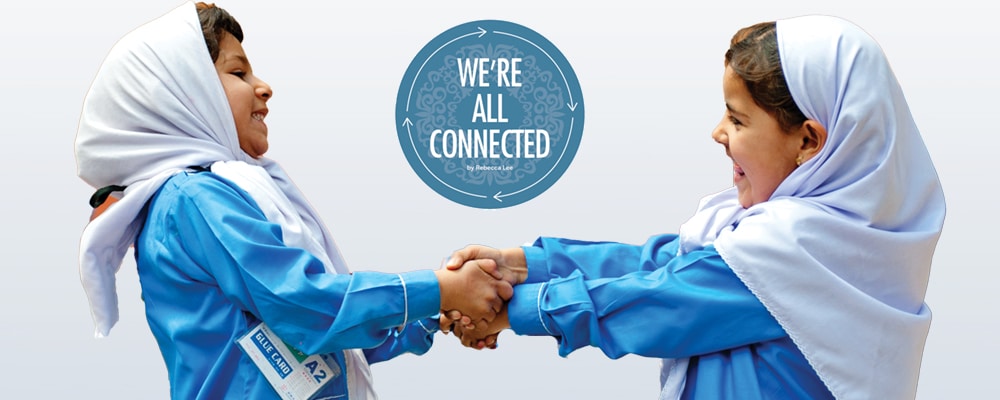We're all connected
By Rebecca Lee
Ask Ruth Abad for the key to the world’s problems, and she answers with one word: education. Ask her to be more specific, and she gives you this: education for girls and
young women.
“Educated girls marry later,” she says. “They have fewer children. Research shows that educating girls has a positive effect on their health outcomes, on their economic opportunities—I could go on and on.”
Ruth learned early in life that when a family has limited resources, the boys get priority. She sees that dynamic at play in Central Asia.
“I’m 76 years old,” she says. “I graduated from high school in 1962. My parents planned to pay for college for me and my brothers, but the message was, if the money runs out, the boys will go because they will have to support a family.”
Thankfully, the college money lasted, and Ruth earned a teaching degree.
“I went into elementary education when women had three choices for a major: nursing, teaching, or social work.”
While she was teaching, Ruth volunteered in support of women’s rights and eventually decided to pursue a career in public health.
“I naively applied to several schools,” she recounts. “One was the University of Hawaii. As luck would have it, that year the federal government offered fellowships to students in public health as part of an initiative to improve the public health infrastructure in the U.S. In 1975, the government paid my tuition at the University of Hawaii and gave me a small stipend to live on.”
“Imagine,” she says with disbelief, “a girl from New England goes to graduate school in Hawaii! I’ve always been appreciative and grateful for that experience.”
Gratitude comes up often in conversation with Ruth. “More and more,” she says, “I realize how privileged I am. I’m not wealthy. We’re a middle-class family, but I had the chance to get an education. I’ve had good health care. It breaks my heart that others don’t have these same advantages. It’s wonderful that organizations like Central Asia Institute come in and help communities educate girls.”
Ruth’s interest in Central Asia Institute began with Greg Mortenson’s book, Three Cups of Tea. “That book opened my eyes,” she says. “I found
it amazing.”
The book piqued her interest in that part of the world. Some years later, she heard Mortenson speak at the local high school. He echoed her belief in the power of education, especially for girls and women. She left the event knowing she wanted to support organizations that support women and children.
“It’s just not fair,” she says. “Some people, because of where they’re born and who their parents are, have more benefits and privileges than a person living someplace else. It’s just not right.”
“I live in my own little community,” she explains. “I have contact with my grandchildren, and with friends who have similar values and do the same kinds of activities.” But by supporting CAI, Ruth feels more connected to the world.
“I’m learning that we’re all connected. If part of humankind is suffering, it affects all of us. We can’t live in a bubble.”
Inspired to give
When her granddaughter was born, Ruth decided to put money away every year for her education. Through small gifts at Christmas and birthdays, and contributions to her granddaughter’s education fund, little by little she is ensuring that her granddaughter has the resources to pursue an education no matter what.
Now that her granddaughter is a little older, Ruth has begun talking with her about the plight of children in other parts of the world. Although her granddaughter is only 7, Ruth wants her to be aware that not every girl is as lucky as she is to be born in the United States, go to a good school, have plenty to eat, and see a doctor when she’s sick.
“I show my granddaughter the Journey of Hope magazine. We look at the photos together. We look at the girls in their schools and talk about their situation. The magazine provides an educational opportunity for me to talk with her about what it’s like to grow up in a poor village. I hope I’m slowly helping her understand that not everybody has all the privileges that she has.”
“This little girl has everything she needs,” Ruth explains. “Other girls don’t have that same opportunity. Their families don’t have the resources. Giving to CAI is my small way of equalizing that.”
“‘I give you money,’ I tell her, and I also give to girls on the other side of the world. I’m not heavy handed about it, but little by little, we talk about these things.”
Ruth’s message to other CAI supporters and folks hearing about CAI for the first time is this: “I would tell them that CAI is a well-run organization. They make you feel like you’re making a difference. The money goes where there’s a need. If we want to make
a difference in the world, we need
to provide education to girls and young women.”
Ruth encourages grandparents like herself or aunts and uncles who are helping family members with an education fund to think of other girls and children who don’t have the same privileges.
We hope that you’ll join Ruth and reach out across the globe to give the gift of education to impoverished girls and women in Afghanistan, Tajikistan, and Pakistan






